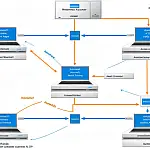What is Software Quality Assurance and Why is it Important?What is Software Quality Assurance? How do you define quality? Where does quality come from? What is quality? All these questions answered.
Quality is often used to describe a product or project outcome, but what is quality? How do you define a quality product? Where does quality come from?
Quality is defined by the International Standards Organisation (ISO) as:
The totality of features and characteristics of a product or service that bear on its ability to satisfy stated or implied needs.
Quality can also mean "fit for purpose" and enforces the idea of "do it right the first time". The term quality is not used to express a degree of excellence in a competitive sense, not in a quantitative sense for technical evaluations.
The objective of Software Quality Assurance (SQA) is to give the customer exactly what they need on time, every time at the right cost. Software Quality Assurance provides the evidence needed to establish quality in work and that the activities involved in the quality process are being performed effectively.
Software Quality Assurance covers all activities within the project, from design and development through to product integration and includes Quality Control and Quality Management.
What is Software Quality Assurance?
Software Quality Assurance (SQA) is a process that ensures software products meet the desired quality standards. It involves a series of systematic activities that are designed to evaluate the quality of software products and ensure they meet the requirements of stakeholders. SQA is an essential part of the software development life cycle and is critical to the success of any software project. It helps to identify defects early in the development process, which can save time and money in the long run.
What is Quality Control?
Quality Control is a set of techniques that are used to fulfil the requirements for quality throughout a project and includes Configuration Management and Quality Management. Quality control activities are aimed at both monitoring a process and eliminating causes of unsatisfactory performance at relevant stages of the quality loop.
A Quality Plan is used to set out the specific quality practices, resources and sequence of events relevant to a particular project. The Quality Plan outlines the purpose of the project, roles and responsibilities of the project, project management overview, life cycle management, documentation produced by the project and how quality will be tested and checked throughout the life cycle using tools such as Audits, Inspections and Walkthroughs. The Quality plan will also specify how change management is handled and how code control is handled.
Quality Management
Quality Management includes strategic planning, allocation of resources and other systematic activities for quality such as quality planning, operations and evaluations.
The attainment of the desired quality requires the commitment and participation of all members of the project.
The Importance of Software Quality Assurance
Software Quality Assurance (SQA) is critical for ensuring that software products fulfil the quality requirements that are expected. Without SQA, software products may contain flaws that cause customer unhappiness, economic loss, and reputational harm. SQA aids in the early detection of problems in the development process, which saves time and money in the long run. It also guarantees that software meets the needs of stakeholders and is delivered on time and budget. Overall, software quality assurance (SQA) is an integral component of the software development life cycle and is critical to the success of any software project.
The Benefits of Software Quality Assurance
Software Quality Assurance (SQA) has various advantages. SQA aids in the early detection of problems in the development process, which saves time and money in the long run. It also guarantees that software meets the needs of stakeholders and is delivered on time and budget. SQA contributes to increased customer satisfaction and loyalty by improving the overall quality of software products. Furthermore, SQA can assist in lowering the risk of software failures and security breaches, both of which can have major ramifications for enterprises. Overall, software quality assurance (SQA) is an integral component of the software development life cycle and is critical to the success of any software project.
The Role of Software Quality Assurance in the Software Development Life Cycle
SQA (Software Quality Assurance) is an essential component of the software development life cycle (SDLC). It is a process that starts with planning and continues through development, testing, and deployment. SQA guarantees that software meets the desired quality requirements and is delivered on time and budget. It also aids in the early detection of faults, which can save time and money in the long run. SQA is a vital component of the SDLC and the success of any software project.
Best Practices for Implementing Software Quality Assurance
Implementing Software Quality Assurance (SQA) can be a complex process, but some best practices can help ensure success. First, it's important to establish clear quality standards and metrics for the project. This will help to ensure that everyone involved in the project is working towards the same goals. Additionally, it's important to involve all stakeholders in the SQA process, including developers, testers, and end-users. This will help to ensure that the software meets the needs of all parties involved. Finally, it's important to continuously monitor and evaluate the SQA process to identify areas for improvement and ensure that the software is meeting the desired quality standards.









